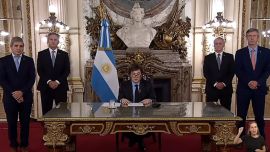The government was dealt a new blow on Thursday, after the INDEC national statistics bureau released data indicating that Argentina’s poverty rate in the second half of 2018 rose to 32 percent, the worst recorded figure by the bureau since 2002 and a jump of more than six percentage points on the previous year.
Some 6.7 percent of citizens are living in a state of extreme poverty, INDEC said, the highest level since 2014 and up from 4.8 percent the previous year.
The headline figure comes after a year of economic turmoil and indicates an acceleration in the rate. In the second half of 2017, poverty stood at 25.7 percent according to INDEC, rising to 27.3 percent in the first half of 2018.
Thursday’s data, based on INDEC’s Permanent Household Survey (EPH), indicates that 12.96 million people in Argentina are now considered poor. In the last calendar year, some 2.6 million people fell below the poverty line.
INDEC, which measures poverty by income, now concludes that 8.9 million people in the 31 largest urban centres in Argentina live below the poverty line. The bureau does not measure poverty in rural areas, limiting its scope only to main cities.
In a worrying detail, the number of poor children aged between 0 and 14 years increased from 39.7 percent in the latter part of 2017 to 46.5 percent at the end of 2018.
The news completes a run of poor economic indicators for President Mauricio Macri and his government, with a crucial presidential election due in October. However, the Casa Rosada is hoping the economy will improve in the run-up to the vote.
Poverty has risen in Argentina after a year of economic turmoil, with the country now in a recession. Last year, GDP contracted by 2.5 percent and inflation skyrocketed to 47.6 percent – its highest recorded tally since 1991. Meanwhile, the national currency, the peso, lost more than half its value in a currency crisis. The subsequent fall in purchasing power – with inflation outstripping wage increases – has left many Argentines on the breadline.
“Last year was the worst since 2002,” CITR A–UMET analyst Daniel Schteingart told La Nación.
Unemployment at present stands at 9.1 percent, but it is expected to rise into double digits later this year. Inflation is showing no sign of stopping its meteoric rise, with price increases totalling 6.8 percent in the first two months of 2018.
As the data was released, a group of trade union activists held a demonstration outside the doors of INDEC’s headquarters, expressing their discontent with the government’s economic policies.
The protesters handed out 500 kilos of free bread, seeking to emphasise the hardship facing Argentines.
CAMBIEMOS REACTION
Facing the press after the release of the numbers, senior Cambiemos officials said it was a “sad day.”
“Poverty hurts and today is a sad day, as it was yesterday and as it was a year ago,” said Health and Social Development Minister Carolina Stanley, saying that Argentina was in the “tail of a crisis.”
“In the government we thought we could lower inflation faster, and clearly, inflation impacts the poverty figure,” she added, flanked by Production and Labour Minister Dante Sica.
Inflation in Argentina totalled 47.6 percent in 2018 and the government has failed to halt price increases.
“We reiterate that we will continue to prioritise the reduction of poverty, we will continue to support food programmes, we will continue to build sewers and carry drinking water,” Stanley told a press conference, arguing that poverty was more than just a household’s income, which is how INDEC’s data is measured.
“The national government works on the subject of the poverty from each ministry and considers poverty in all its dimensions,” she added.
The minister emphasised, however, that the pressure on the national government was a result of having accurate data. Cambiemos had “decided to tell the truth and talk about the issue,” the minister said – a reference to the massaging of data that took place at INDEC under the previous government led by Cristina Fernández de Kirchner.
Stanley was quizzed, in addition, about President Mauricio Macri’s famous ‘pobreza cero’ (“zero poverty”) pledge he delivered during campaigning ahead of the 2015 election. The minister argued the phrase was not a promise, but rather an aspirational target.
“Zero poverty, beyond having mentioned it in the campaign, has to do having with an objective, a horizon, a way of working,” she explained.
Both Stanley and Sica indicated there was no turning back, with the production and labour minister saying the government “confirms and maintains the economic course.”
Sica said the existing policies in place would “allow a sustained recovery and a much more stable growth” further down the line.
President Mauricio Macri, speaking in Córdoba, said Thursday that the nation was on the correct path.
“Today, we can say that Argentina is at a better point than in 2015. Better doesn’t mean that we are where we want to be, but that we have got out of the plight we were in,” the president said during a speech.
Addressing poverty and the economy, he declared: “To change the situation that many Argentines are suffering poverty, we must reduce the fiscal deficit – the true cause of inflation and poverty.”
























Comments